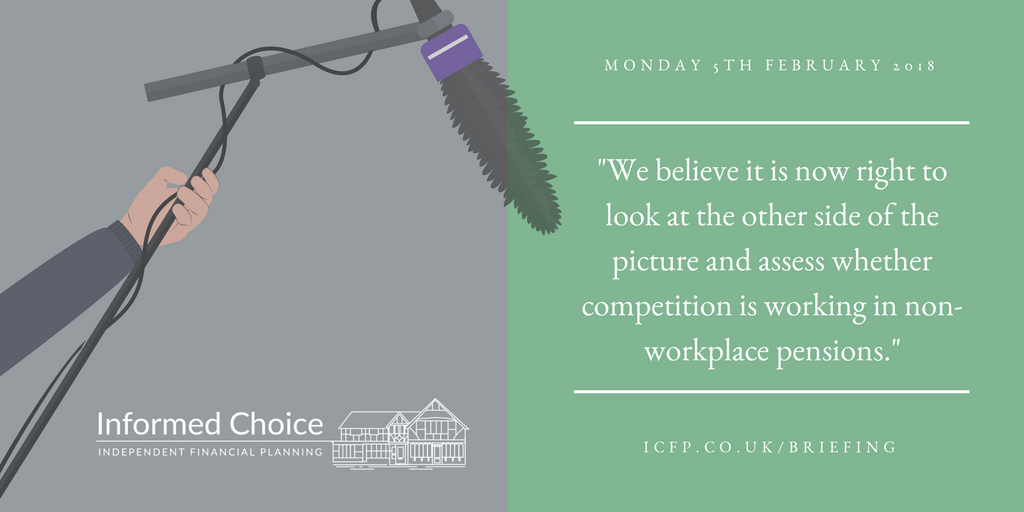In this edition of The Briefing from Informed Choice on Monday 5th February 2018 – FCA gathers views on private pensions, banks ban crypto credit card purchases, widening graduate gender pay gap, construction jobs forecast, and funeral shortfall warning.
Subscribe to The Briefing by email
FCA gathers views on private pensions
The Financial Conduct Authority (FCA) has published a Discussion Paper to gather views on the market for non-workplace pensions.
The FCA estimates that non-workplace pensions, also known as individual private pensions, collectively represent around £400bn assets under management. This is more than double the amount invested in contract-based Defined Contribution (DC) workplace pension schemes.
Research suggests that at least 1 in 4 adults have accumulated benefits in non-workplace pensions.
The FCA is seeking feedback to better understand the market for non-workplace pensions, including whether competition is working well and if there are issues that need to be addressed in order to protect consumers.
Christopher Woolard, FCA Executive Director of Strategy and Competition, said:
In recent years we, alongside the Department for Work and Pensions and the Pensions Regulator, have taken a number of steps to address weaknesses in the workplace pensions market.
We believe it is now right to look at the other side of the picture and assess whether competition is working in non-workplace pensions.
A diverse group of people save into non-workplace pensions and it is a growing market. We want to hear from anyone with an interest in this subject about how they think the market is working.
Banks ban crypto credit card purchases
A group of the world’s largest banks have banned customers from using their credit cards to buy cryptocurrencies, following further market volatility. J.P. Morgan Chase, Bank of America, Citigroup, and Lloyds Banking Group placed the restrictions after the price of Bitcoin fell sharply on Friday to below $8,000. The cryptocurrency reached a peak of over $19,000 in December.
A spokesperson for Chase said:
At this time, we are not processing cryptocurrency purchases using credit cards, due to the volatility and risk involved. We will review the issue as the market evolves.
The move follows a similar ban from Capital One last month. Bloomberg reported the bans are designed to prevent customers from making hugely risky purchases on their credit lines or scammers from buying cryptocurrency and disappearing. The bans though do not necessarily affect debit card purchases.
Widening graduate gender pay gap
There’s a widening pay gap between male and female graduates, according to a new report from the Institute for Fiscal Studies. The report also found that the pay gap for lesser-educated men and women is narrowing.
The study found that average hourly wages for male and female graduates varied by 22% in 2016, wider than the 21% reported in 1993. Overall, women are earning 20% less than men, down from a gap of nearly 30% reported in 1993.
The report said:
The effect of part-time work in shutting down wage progression is especially striking. Whereas, in general, people in paid work see their pay rise year on year as they gain more experience, our new research shows that part-time workers miss out on these gains.
Construction jobs forecast
More than 150,000 construction jobs are expected to be created during the next five years, according to a new forecast by the Construction Industry Training Board (CITB). This is despite the recent collapse of construction giant Carillion and uncertainty surrounding Brexit negotiations.
The forecast is predicting a further 15,350 carpenters and 9,350 labourers will be required to meet demand as new homes are built. Professional and managerial roles will experience the strongest growth in an industry which aims to boost productivity.
The CITB forecasts average construction output growing by 1.3% a year, resulting in 158,000 new jobs created over the next five years. It expects infrastructure to be the strongest sector, growing by 3.1% a year.
Funeral shortfall warning
Over 50’s plans have an average shortfall of more than £1,500 each when used to cover funeral expenses, according to a new warning by Co-op Funeralcare. The new research found more than three quarters (78%) of over-50’s plan holders took out their plan, with a view to it paying for their funeral costs.
Worryingly, over half (51%) of those who intended to use their plan to pay for their funeral are unaware there will likely be a shortfall. Unlike some funeral plans, which fully guarantee the costs, over 50’s plans pay out a cash sum when the individual dies, which may not cover the average cost of a funeral.
With 380,000 UK adults taking out over 50’s plans annually, the Co-op is warning that millions of families face an eventual shortfall when it comes to funding their loved one’s funeral.
Matt Howells, Managing Director of Co-op Legal and Later Life Planning, said:
Our research shows that many people take out over 50’s plans to cover the cost of their funeral, but are unaware that some over 50’s plans are not linked to inflation. This means that it’s more than likely that loved ones will be left with a financial shortfall to cover the cost of the funeral.
What is more, people opting to pay for their over 50’s plan because it’s a way of spreading the cost, may not have thought about other options such as those funeral plans which cover the full cost of a funeral, and offer a monthly payment option at the same time.
Subscribe to The Briefing by email
 Informed Choice Radio provides a regular personal finance and investment news summary, with an updated Flash Briefing for your Alexa enabled device. Search for Informed Choice Radio in your Amazon Alexa app or visit https://www.amazon.co.uk/Informed-Choice-Radio/dp/B074DZZ1MF/ to enable this Flash Briefing.
Informed Choice Radio provides a regular personal finance and investment news summary, with an updated Flash Briefing for your Alexa enabled device. Search for Informed Choice Radio in your Amazon Alexa app or visit https://www.amazon.co.uk/Informed-Choice-Radio/dp/B074DZZ1MF/ to enable this Flash Briefing.


